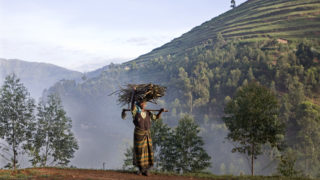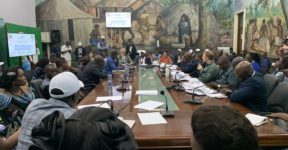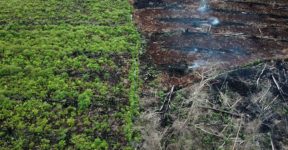
Why Good Governance Means Giving Forest Communities a Say
Vanessa Nakate, a young Ugandan activist, argues that conversations on forests must draw on the expertise of local communities who live and work in forests, rather than those who conventionally carry the influence on the global stage.
When it comes to managing the world’s forests, there are many players involved. Governments and corporations in both producer and consumer countries, donors, scientists and researchers from numerous disciplines all have a stake in good forest governance and all have vital contributions to make.
But, as a young Ugandan climate activist, it is clear that when discussing forest issues we have tended to privilege the perspectives of those regarded as international leaders instead of the expertise of local communities who dwell in, and around, forests.
Despite years of warm words, the knowledge and opinions of local communities are often forgotten and all too often are not included in decision-making processes in any meaningful way. But, as we move towards the rescheduled COP meetings in 2021, now is the time to change this.
Indigenous communities have in-depth knowledge about the problems and solutions facing forests which should not be ignored. Women in particular are often the most dependent on forests for food and medicine, for example, yet representatives of these marginalized groups are routinely left out of discussions about the preservation of the natural assets on their doorsteps. That’s especially the case for women, and therefore gender equality should be a prerequisite to effective forest management.
But engaging forest communities in good governance isn’t just the right thing to do. Participation is a critical means to ensure the best solutions are put forward by governments, think-tanks and universities that work in practice.
In my country, Uganda, for example, there is a huge demand for firewood which can be significantly reduced through the introduction of more efficient stoves. But without the right support – technical and financial – heavy users of firewood, like schools in rural forest communities, will not reduce their demand.
Similarly, the science around forests is advancing all the time. Globally, more is being understood about forests, how they work and their role in climate change than ever before. But how often is this multidisciplinary knowledge translated from, and to, the communities who live in and around them? Not often and so the time is right to unite indigenous and scientific knowledge and combine lived experience with cutting-edge research. After all, people can only protect what they know to be in danger. But how should this be done?
First, we need to translate the latest science of forests governance into languages that local communities can understand. The level of formal education among local communities may not be high but good forest governance is too important to be the preserve of educated elites. Therefore the conversation needs to start being inclusive.
Second, we need to focus on rule of law and accountability. There are laws in place in some parts of the world which are working, but elsewhere, laws exist only on paper and are not enforced. Frontline forest communities can help to ensure that changes but, to be able to do so, they need to be empowered to hold their governments to account.
Inevitably, the conversation around forest governance must remain a global one, with all countries engaged. But over the next 15 months, ignoring the experience of forest communities will be at a great cost. So what can countries do on forest governance ahead of the COP meetings next year? My answer is simple: ensure that those whose lives are inextricably connected to the health of the world’s forests have a say in the decisions that are made about them. That’s how a future with thriving forests is possible.


